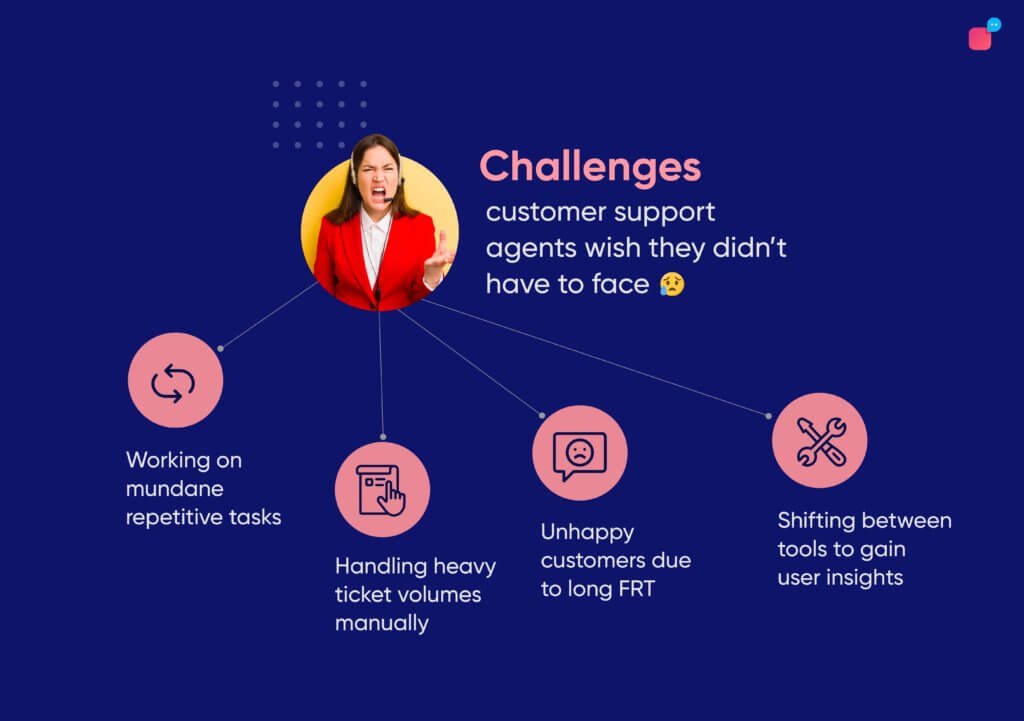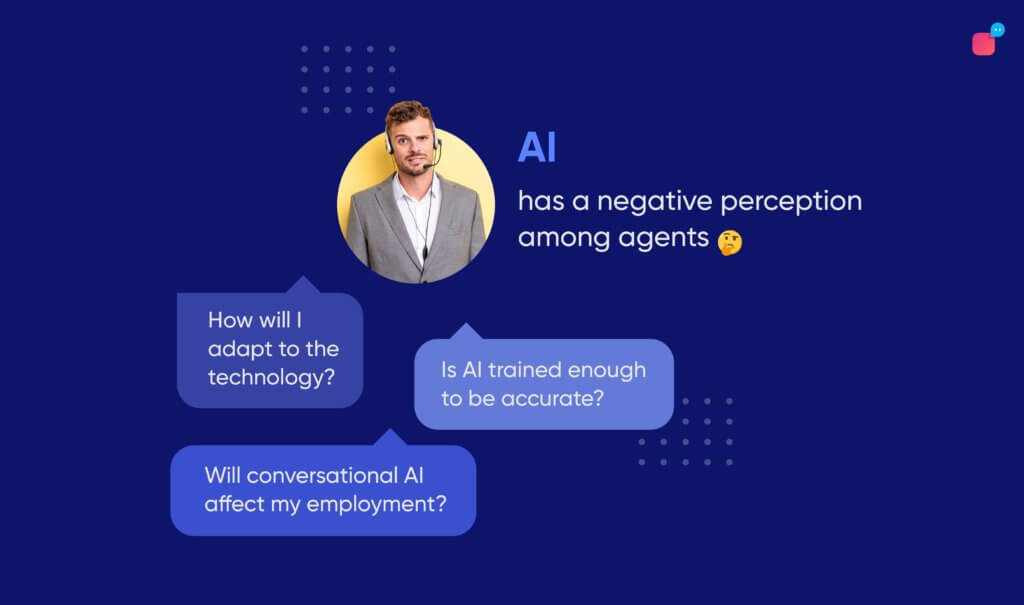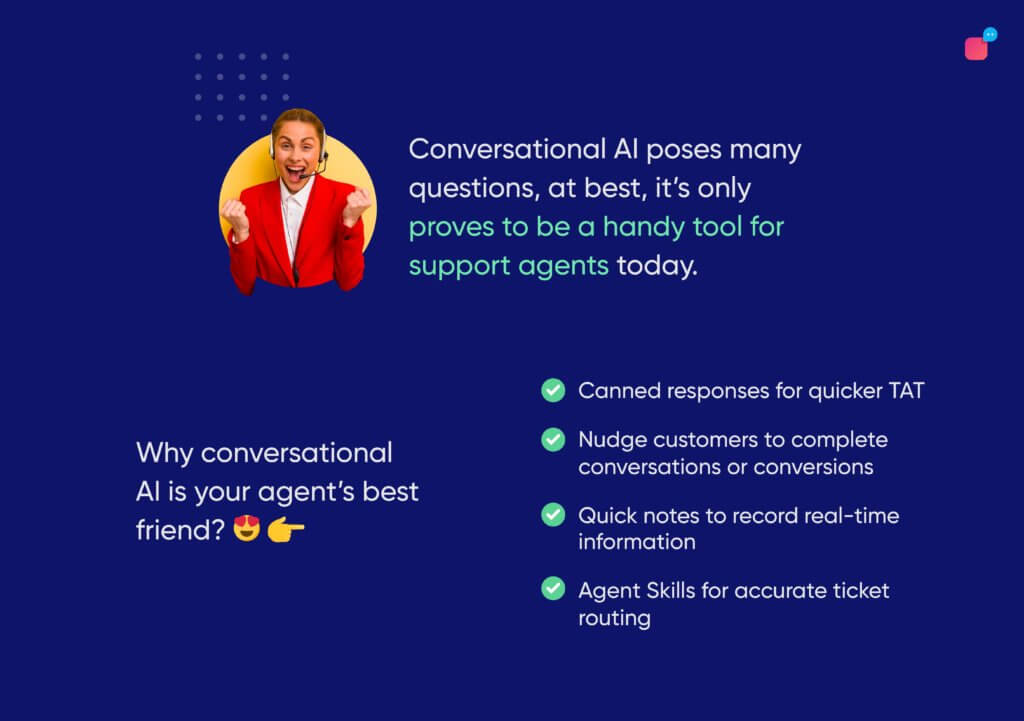Conversational AI Chatbots: Good or Bad For Your Support Agents?

Conversational AI Chatbots: Good or Bad For Your Support Agents?
Will AI reduce jobs? Will AI take our jobs?
Several questions arise whenever we talk about implementing AI. We are conditioned to believe that evolving AI is no good. It’s the fear cinema has set in the hearts of people – What will happen when the AI takes over? The answer sends jitters down our spine. While AI might pose a few hard-hitting questions, the deep-rooted notion is an exaggeration. In the practical world, it has to do more with the fear of unfamiliar technology and its impact on conventionally embedded business processes.
For example, there is a reason why your agents may be hesitant about adopting conversational AI chatbots and believe it’s bad. As typically conceived, AI may pose a threat to their employment. And if not, it sounds like too drastic of a tech change for agents to keep up.
An alternative perspective: Automation is actually set to create more jobs in the market. We come bearing facts, not theory. By this year alone, automation will drive top-level executives to scale their workforce capacity by 27%. This equals 2.4 million additional full-time opportunities up for grabs across 523 companies that participated in the survey.
Despite the challenges, it’s still worth exploring the different sides of conversational automation.
What different challenges do support agents face?
Let’s face it: working on the same thing over and over again, with an overflowing stream of similar tasks is energy-draining. Most of the contact and call centre agents are still a part of a rusty support engine that is far, far behind in keeping up with the modern consumer.

So what are the specific challenges agents are left to face by themselves?
- Monotony: Customer support agents face a flow of support tickets that more or less revolve around a similar intent. Repetitive work siphons enthusiasm and willingness, eventually leading to more attrition.
- Inefficiency: An unending stream of tickets not only lets monotony set in but also throws your agent’s productivity off-balance. They often get more work than they can manage, resulting in increased pressure, slower response times, or worse missed deadlines. All in all this frustrates buyers and spoils their experience with the business.
- Loose-ends: Consistency is indispensable for customers today. As much as 65% of users expect positive consistency whenever they interact with the business. Consistency marred by inadequate training poses a challenge to agents. At the end of the day, your customers don’t get satisfactory support, making them feel left out creating a poor image of your brand.
When these issues are not taken care of in the beginning, they can end up creating more significant problems, such as frustrated customer service reps, unhappy customers, loss of sales, etc.,
The good news is that these issues are actually easily solvable. While conversational AI may sound like a new concept for your team, the technology has time and again proved its utility.
How customer support teams are using AI chatbots
Conversational AI chatbots are excellent at handling common customer queries.
For example, the Abu Dhabi Islamic Bank’s AI “Chat Banking” bot is able to handle 80% of all incoming queries that agents had to manually resolve. This in turn resulted in about a 20% reduction in call centre volumes.
Conversational AI lets you proactively engage with your customers on their preferred channels for quicker response and TAT. Customer support differs across businesses of all kinds. The good thing about conversational AI though is that it is highly malleable. You can train your chatbot to identify and process intents specific to a niche, to maintain remarkably relevant responses through support interactions – with the right industry datasets.
Conversational AI can collect, store, and monitor customer info to provide relevant resolutions in real-time. This cuts down hold time and reduces the need to transfer the call to another agent unless absolutely necessary.
And it leads to a better customer experience, lessens service agent workload by as much as 80%, and increases customer retention and employee satisfaction.
Suggested Reading: How To Formulate A Winning Conversational AI Strategy In 2022
Why conversational AI may seem bad to agent employment and established support processes

There are two sides to every story. Above we saw the rosy picture of how CAI is an agent’s best friend – removes repetitive tasks, shows a comprehensive customer profile, improves productivity, etc. But what about the other side? Nothing is black and white. Let’s discuss the grey areas of CAI – why some agents resist this new technology.
1. Agent employment
“Will AI take our jobs?” To answer this question – AI is far away from the logic that goes into human judgement. It goes without saying that human intuition is critical and AI, at best, can complement your team’s productive hours. But it doesn’t lessen the worry of service agents who think that someday some advanced AI will do their job. Even during the industrial revolution, there was a general air of fear revolving around “Will machines take our jobs?”. However, the industrial era only gave rise to more jobs, which people were quickly able to take up – only with little upskilling.
2. Tech proficiency
New technology is overwhelming. Transitioning from an established process to a newer one might not be welcomed by support teams. The obviously efficient choice may take a backseat because – extensive training and mutual acceptance take time. Eventually, this may build a negative perception of the change in the minds of your agents. This is why it’s crucial to have a well-drafted GTM plan before you dive into implementing conversational AI.
3. Untrained AI can make your work difficult
Your AI can be as good as you train it. Not every conversational AI chatbot is clueless about what your users are saying – the key lies in systematic training, testing, and refinement. However, if the AI isn’t trained well, it will lead to frustrated customers. AI may not accurately pick up on user intent, tone, and emotion and have no contextual understanding during interactions. So when the chat is eventually transferred to agents, they are left to deal with angry customers demanding the quickest answers. Also read: How to make your AI chatbot more human and empathetic?
How conversational AI is beneficial for customer service agents
Apart from automating repetitive tasks and freeing up their time to do other important work, there are different other ways conversational AI proves to improve support team productivity and helps you to channel their efforts to deliver a holistic CX.
AI quantifies its positive impact: AbhiBus, an Indian OTA platform, used conversational AI to boost its agent productivity by 33% with the bot resolving up to a phenomenal 96% of queries!
For example, an end-to-end conversational AI solution comes equipped with convenient live chat features that cushion agents’ work in real-time.
1. Using canned responses and pre-written scripts
Canned responses are pre-populated, ready-to-send responses that let agents respond to repetitive customer queries instantly with a simple click. These pre-defined responses help agents navigate support interactions at warp speed. Assign tags to specific responses to quickly search and send them to users within seconds, significantly improving your agent’s first resolution time.
2. Rope users back to conversations with Nudge
Consider this feature as a subtle nudge you give users when they haven’t given relevant information you seek or haven’t converted. You can nudge your users before the chat window closes or set up a trigger for a campaign after a decided time. This ensures your agent is able to derive value out of each support interaction.

3. Easily make quick notes during chats
Data here, data there, data important everywhere! Your users are more than likely to relay quite crucial information when they are conversing naturally with your agent. You can’t miss that information. This is where AI can turn into your personal assistant keeping track of important data points – just like minutes of a meeting. This information can then help your agent arrive at answers highly valuable to the user – in a fast and accurate fashion.
4. Agent skills for laser-sharp results
Expertise brings delightful experiences for your users who eventually convert. Put your most experienced agents first to resolve queries they are best qualified for – with the Agent Skills feature. The Agent Skill Routing feature helps your team quickly identify which agent is the right fit to resolve a ticket – based on skills that may fall under the relevant department, location, language proficiency or concurrency (ability to handle n number of tickets).
Is conversational AI – detrimental or beneficial to your agents?
Conversational AI provides many benefits. However, it’s also clear that it still faces many challenges, so it’s crucial to create the best balance between human agents and chatbot technology.
Conversational AI will not eliminate the need for human support agents but bolster their work. They are complementary tools that help agents manage easy questions while leaving them to handle more complex and emotional issues with customers. A human touch in customer service is necessary as many customers value human advice more than conversations with conversational AI.







